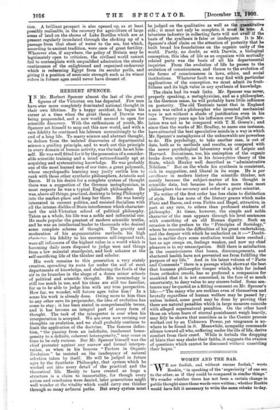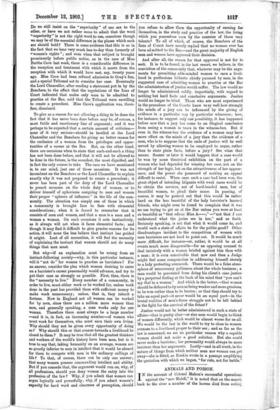WOMEN AND THE BAR.
WE are foolish, and without excuse foolish," wrote, Ruskin, "in speaking of the 'superiority' of one sex , to the other, as if they could be compared in similar things." . We wonder whether there has not been a certain change in public thought since those words were written; whether Ruskin would have felt it necessary to write the same rebuke to-day. Do we still insist on the " superiority " of one sex to the other, or have we not rather come to admit that the word "superiority" is not the right word, to use, conscious though we may be of the essential difference in the plaaes which each sex should hold P There is some evidence that this is so in the fact that we hear very much less to-day than formerly of
women's rights "; and even when that subject is brought prominently before public notice, as in the case of Miss Bertha Cave last week, there is a considerable difference in the reception and treatment with which it meets from the reception with which it would have met, say, twenty years ago. Miss Cave had been refused admission to Gray's Inn, and a special Tribunal sat to consider her case. Eventually the Lord Chancellor, after reading a statement put in by the Benchers, to the effect that the regulations of the Inns of Court indicated that males only were to be admitted to practise at the Bar, said that the Tribunal were unwilling to create a precedent. Miss Cave's application was, there- fore, dismissed.
To give as a reason for not allowing a thing to be done the fact that it has never been done before may be, of course, a most futile and reactionary line of argument; and it was perhaps to be expected that a certain amount of criticism— none of it very serious—should be levelled at the Lord Chancellor and the Benchers for giving no better reason for the exclusion of a woman from the privileges and oppor- tunities of a career at the Bar. But, on the other hand, there are occasions when to state that such-and-such a thing has not been done before, and that it will not be allowed to be done in the future, is the soundest, the most dignified, and in fact the only course to take. The case we have mentioned is, to our mind, just one of those occasions. It was not incumbent on the Benchers or the Lord Chancellor to explain exactly why it was not proposed to create a precedent ; it never has been part of the duty of the tord Chancellor to preach sermons on the whole duty of woman, or to deliver himself of aphorisms assigning to men and women their proper "spheres of influence" in the life of the com- munity. The situation was simply one of those in which a community is brought face to face with elemental considerations ; when it is forced to remember that it consists of men and women, and that a man is a man and a woman a woman. On such occasions it acts instinctively, as it always will act when it faces elemental facts; and though it may find it difficult to give precise reasons for its action, it will none the less believe that instinct has guided it aright. Last of all necessities, it will feel the necessity of explaining the instinct that women should not do many things that men must.
But why—if an explanation must be wrung from an instinct-following society—why, in this particular instance, will it "not do" for women to practise as barristers ? For an answer, consider the plea which women desiring to enter on a barrister's career presumably would advance, and try to put their case as strongly as possible. First, then, there is the "necessity to live." Every member of a community, in order to live, must either work or be worked for, unless work done in the past has provided them with sufficient money to make work unnecessary; unless, that is, they inherit a fortune. Now in England not all women can be worked for by men, since there are a million more women than men, and generally speaking, a man works only for one woman. Therefore there must always be a large number —and it is, in fact, an increasing number—of women who must work for themselves, who must earn their own living. Why should they not be given every opportunity of doing so P Why should this or that avenue towards a livelihood be closed to them P It may be true that all the greatest thinkers and workers of the world's history have been men, but is it true to say that, taking humanity on an average, women are so greatly inferior to men in intellect that it would be absurd for them to compete with men in the ordinary callings of life P To that, of course, there can be only one answer; that many women possess commanding intellect and ability. But if you concede that, the argument would run on, why, of all professions, should you deny women the entry into the profession of the law P Why, if you admit that women can argue logically and powerfully; why, if you admit women's capacity for hard work and clearness of perception, should
you refuse to allow them the opportunity of earning for themselves, in the study and practice of the law, the living which you yourselves earn by the exercise of those very talents ? To all of which, of course, the Benchers of the Inns of C ourt have merely replied that no woman ever has been admitted to the Bar,—and the great majority of English men and women have approved their decision.
And after all, the reason for that approval is not far to seek. It is to be found, in the last resort, we believe, in the conviction of the community that, whatever may be the argu- ments for permitting able-minded women to earn a liveli- hood in professions hitherto chiefly pursued by men, in the suggested case of admitting women to practise at the Bar the administration of justice would suffer. The law would no longer be administered coldly, impartially, with regard to nothing but hard facts and conclusive arguments. Justice would no longer be blind. Those who are most experienced
in the procedure of the Courts know very well how strongly the minds of a jury can be influenced by the giving of evidence in a particular way by particular witnesses ; how, for instance, to suggest only one possibility, it has happened before now that a jury has come to an illogical conclusion from seeing a woman in tears in the witness-box. But if even in the witness-box the evidence of a woman may have more effect on the minds of a jury than the evidence of a man, who is to suppose that the ends of justice will be well served by allowing women to be employed to argue, rather than to state plain facts, before a jury ? See what that means. Sooner or later it would happen that a case would be won by some theatrical exhibition on the part of a woman who had depended for winning her case, not on the strength of her logic, but on the attractiveness of her appear- ance, and the power she possessed of making an appeal difficult to resist. When once such a case had been won, the great object of intending litigants with weak cases would be to obtain the services, not of hard-headed men, but of beautiful women, to plead their cause. In passing, of course, it may be pointed out that this would be rather hard on the less beautiful of the lady barrister's learned friends, who might even be found to complain that it was no use trying to get on at the Bar unless you were at least as beautiful as "that odious Miss A—," —"not that / can understand what the juries see in her," and so forth. Seriously speaking, is not that what it would come to, and would such a state of affairs be for the public good P Other disadvantages incident to the competition of women with men barristers are not hard to point out. It would be much ' more difficult, for instance—or, rather, it would be at all events much more disagreeable—for an opposing counsel to deal incisively with a woman briefed against him than with a man : it is even conceivable that now and then a Judge might feel some compunction in addressing himself sternly to a lady protesting overmuch. There would be a false atmo- sphere of unnecessary politeness about the whole business ; a man would be prevented from doing his client's case justice by a perpetual feeling at the back of his mind that "you can't say that to a woman." And which is the better,—that women should be deferred to by men as being weaker and more gracious, to be won rather than to be beaten; or that they should try to take an equal part—it never would be an equal part—in the brutal realities of men's fierce struggle not to be left behind in the fight for the survival of the fittest P
Justice would not be better administered in such a state of affairs—that is pretty clear—or else men would begin to think of women differently, which would be almost worse for us all. We would be the last in the world to try to close to women avenues to a livelihood proper to their sex ; and as far as the law is concerned, we see no particular reason why a capable woman should not make a good solicitor. But she could never make a barrister; her personality would always be more insistent than her arguments. Lastly—and in all truth, in the nature of things from which neither man nor woman can get away—she is fitted, as Ruskin wrote in a passage amplifyink the quotation with which we began, "for rule, not for battle."



























































 Previous page
Previous page